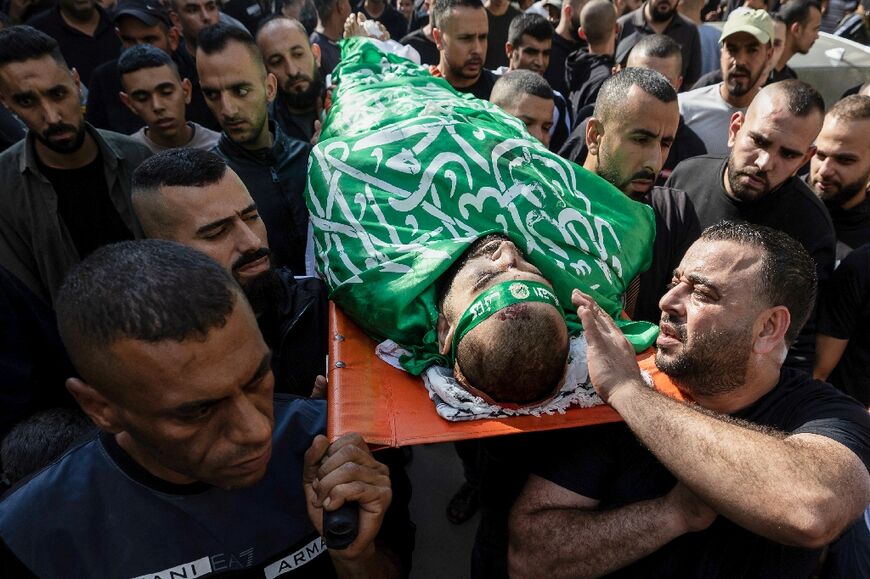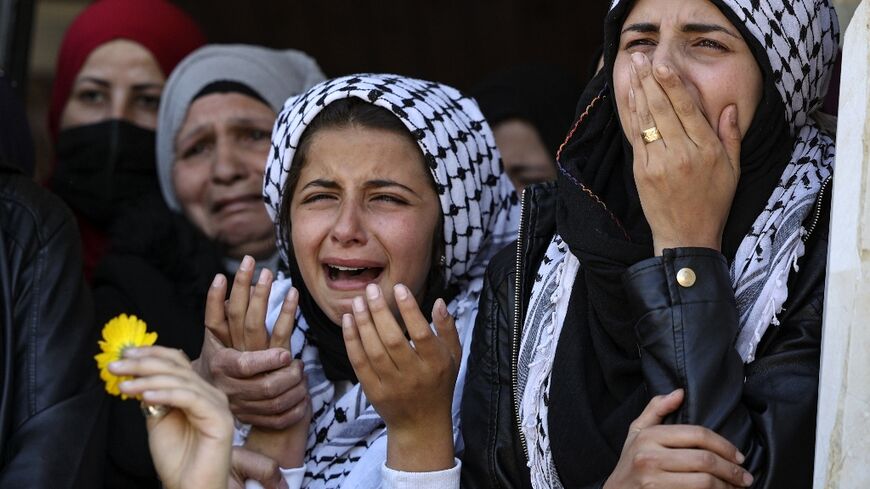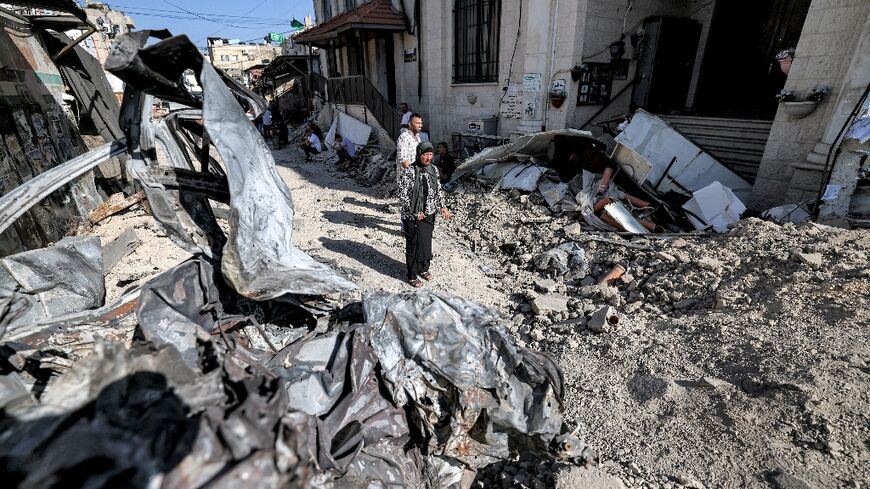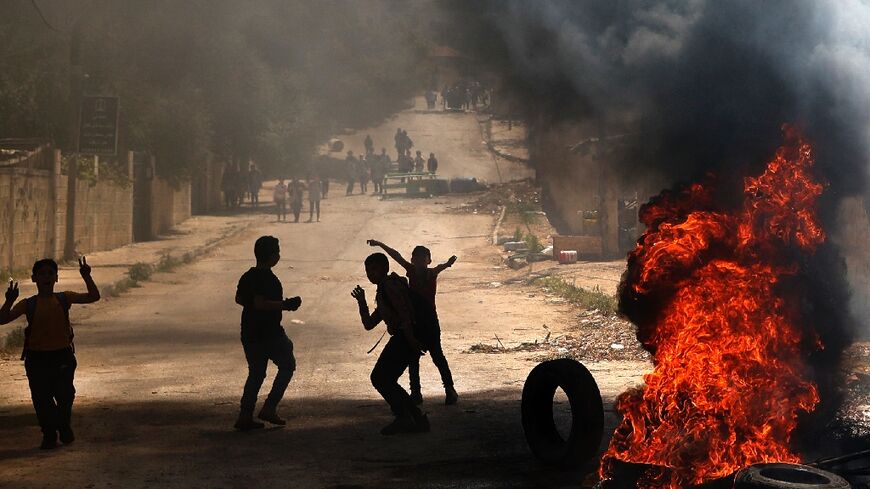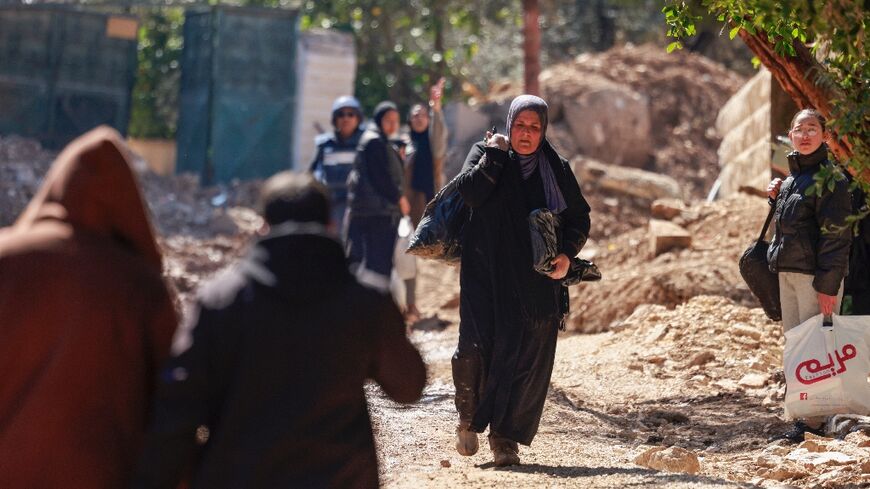Violence bleeds through generations in West Bank's Jenin

In the occupied West Bank city of Jenin, heavily pregnant Madleen Sabbagh fears years of violence are bleeding through the generations after her husband was among the latest to be killed.
Seven months pregnant, sitting at a window overlooking the densely populated Jenin refugee camp, Sabbagh said she stopped eating after her husband was shot in the heart earlier this month.
According to the family Mohammed Sabbagh, 30, had been standing beside his brother at the very same window during a raid by Israeli forces when he was hit by a sniper.
The couple already had three children and Sabbagh, 24, said: "Certainly as a mother I am concerned about their safety.
"They are my children and I am their mother. But now, I am a mother and a father for them."
The family operates a beauty salon which in happier times hosted wedding receptions, but the windows are now dotted with bullet holes.
Hundreds of Palestinians including militants, bystanders and children have been killed this year during Israeli raids in Jenin, long considered a hotbed of militancy.
Violence across the West Bank has surged on the heels of Hamas's October 7 attacks and Israel's ensuing military campaign against the militant group, and the Sabbagh family is among many in Jenin to have had relatives -- the vast majority of them men -- killed in earlier rounds of violence.
The women of those families bear the consequences for a lifetime, and they reverberate through the generations.
"This is not a life," said Eman Sabbagh, Mohammed's mother. "Those who are martyred are the lucky and blessed ones."
- Sirens wail -
Jenin's refugee camp was a focal point of the Palestinian uprising against Israeli occupation, known as the Second Intifada, in the early 2000s.
In 2002, the army laid siege to the camp for more than a month amid fierce fighting that saw hundreds of homes levelled and 52 Palestinians and 23 Israeli soldiers killed.
Posters of young Palestinian men killed fighting Israeli forces in Jenin camp plaster the walls, which are pockmarked with bullet holes.
As the Sabbagh children played, they did not react to bursts of gunfire from the funeral of a 21-year-old who died from wounds sustained in a recent Israeli raid.
Multiple Jenin residents told AFP that years of violence are having a significant impact on society, particularly with regards to mental health.
"Most of the children can't sleep at night and their mothers stay awake too, as the children scream whenever sirens wail," said Majd Abu Salameh, who works at a local women's centre.
"When you walk in the camp, you only see children," she said.
"It affects us because we are losing the breadwinners and only the elderly remain, while their younger children have either left the camp or were martyred."
- Empty bed -
Israel has occupied the West Bank since the 1967 Arab-Israeli war, and peace talks with Palestinian leaders have been moribund for years.
Some have taken up arms against Israeli forces, including teenagers such as Yamen Jarar, who was killed on November 3.
Dozens of photos of 16-year-old Jarar -- named after a relative who was also killed -- sit beside his empty bed.
"He always wanted to become a martyr, just like others would love to travel, for example," said his mother Jihan Jarar.
"He didn't like what is happening," she added, "and when someone is fervently attached to their homeland, you can't hold them (back)."
One of her two surviving sons stared at pictures of his brother in the living room, his eyes watering as his mother said she did not want another "martyr" among her children.
Samihah Zued, Yamen Jarar's grandmother, described the cascading effect of grief and hardship on the family.
They struggled to pay their sons' school fees and keep them in pocket money, she said.
"This leads to a certain reaction," she said. "When there is no school and nothing else to do, how would young men react then?"
Soon after the family spoke to AFP, sirens blared out across Jenin to warn of approaching Israeli forces.
The fighting lasted for hours, filling the night with the sounds of gun battles, ground-shaking explosions and the incessant buzz of military drones.
The funerals of three local men killed were held the next morning, and the Israeli military put the Palestinian death toll at five.
Madleen Sabbagh told AFP she would "always be afraid".
"We don't know what the future holds for the children when they grow up."




